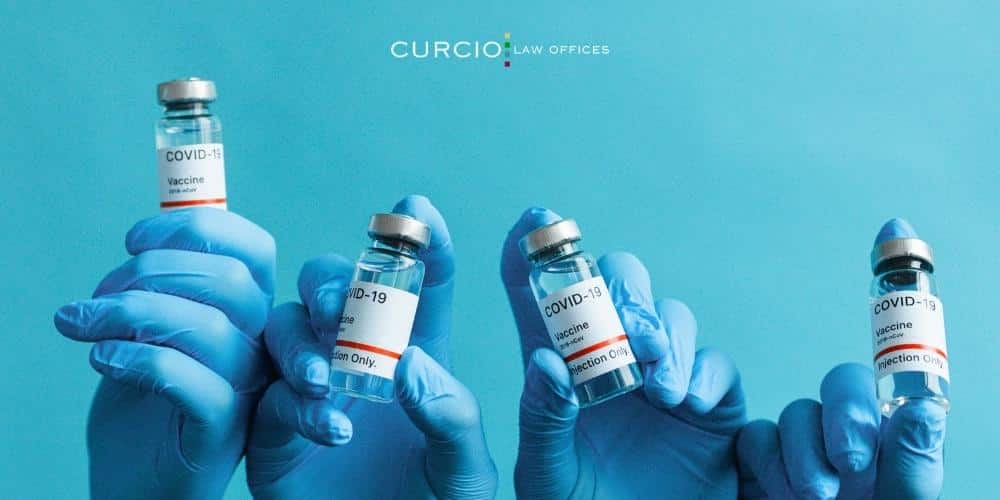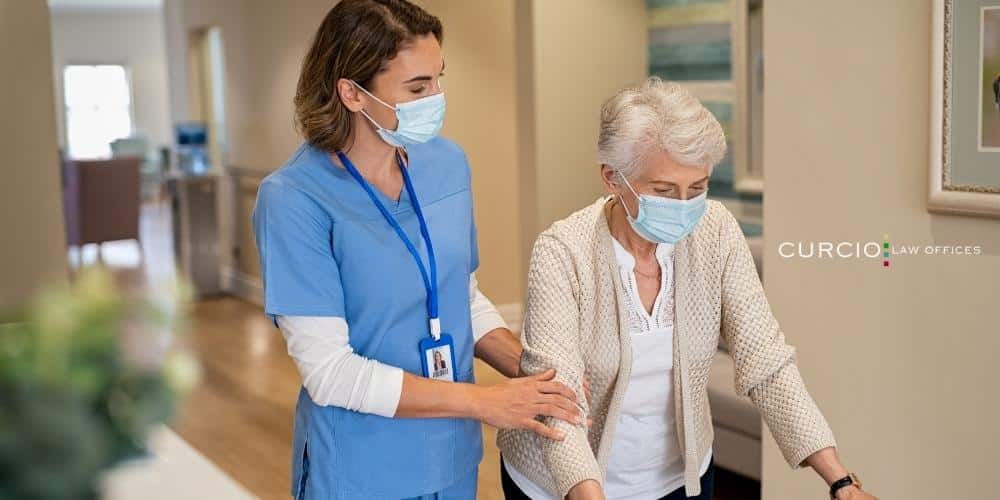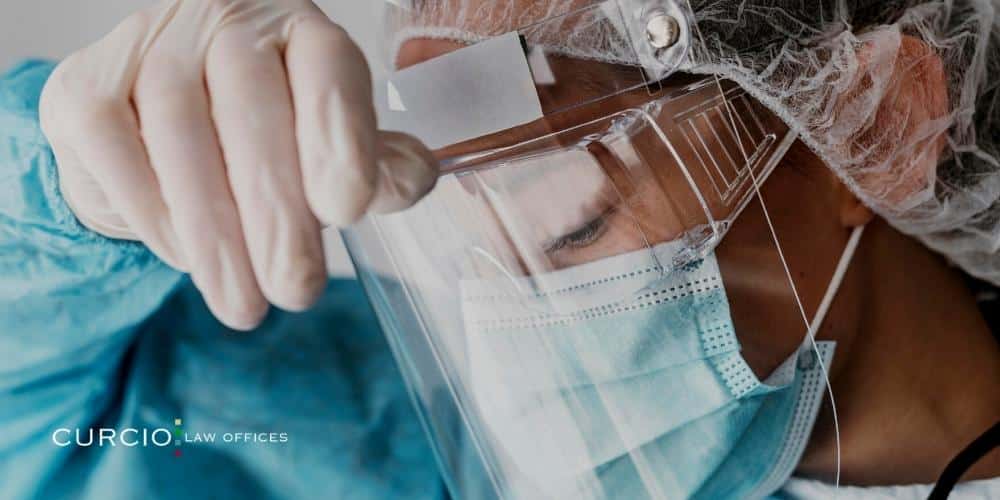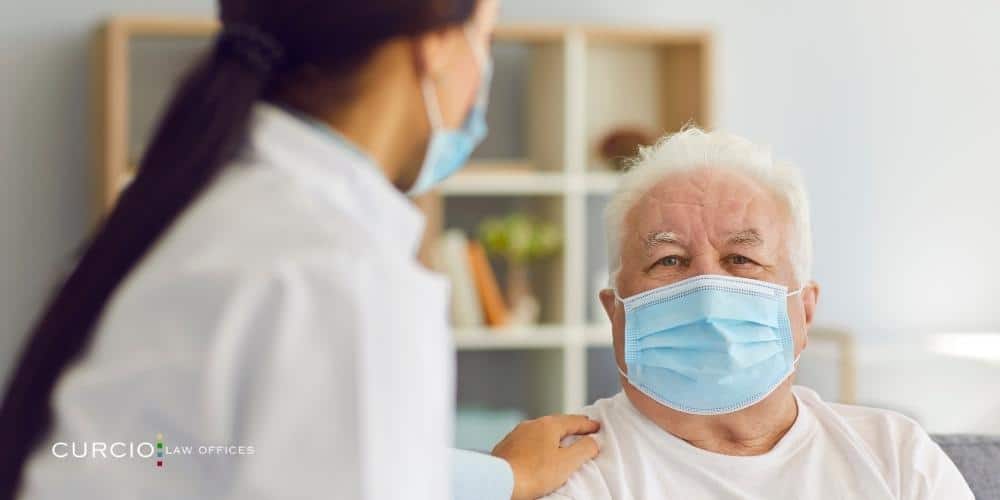CHICAGO COVID 19 NURSING HOME LAWYER
PRACTICE AREAS
COVID-19 in Chicago Nursing Homes
It’s safe to say that – several years into the pandemic – COVID-19 is just a part of our normal lives now. Millions of people have contracted the virus and have even died from the virus. And even though we now have vaccines, people are still going to contract the virus for years to come. Nowadays, COVID-19 doesn’t pose a significant death threat to the majority of our young, healthy, vaccinated population. But the elderly people in our population still have a high risk of contracting the virus and dying from it, whether they’re vaccinated or not. This is even more true for our nursing home residents. While many people don’t believe that the virus is a big deal anymore, COVID19 in nursing homes is a very big deal.
All nursing homes are required to implement strict infection control procedures in order to protect the most vulnerable people in our population. However, due to extreme short staffing in the nursing home industry – another partial product of the global pandemic – these procedures may fall by the wayside. So you may be wondering: if my elderly loved one contracts COVID (or dies from COVID) in their nursing home, can I sue for negligence? In many cases, the answer is yes.
Chicago nursing home negligence lawyers at Curcio & Casciato can listen to your story, investigate your claim, help you determine if you have grounds to file a lawsuit and help you gather sufficient evidence to support your claim. We are the best Chicago personal injury lawyers to have on your side during this impossible time. Call 312-321-1111 to schedule a free consultation with us today.

COVID-19 Basics
COVID-19 is not the first and only type of coronavirus out there. In fact, there are many types of coronaviruses, and they usually cause common cold symptoms.
COVID-19 is specifically known as severe acute respiratory syndrome coronavirus 2 (SARS-CoV-2). The first case of this coronavirus disease occurred in December 2019 in Wuhan City, Hubei Province, China. Medical experts believe that the virus mutated at a live animal market and began infecting humans. Only a few months later, in March 2020, the World Health Organization (WHO) announced that the COVID-19 outbreak was a global pandemic and a public health emergency.
People can develop symptoms 2 to 14 days after initial exposure. Symptoms resolve between 2 weeks to a few months after initial exposure. However, some people later develop “long COVID,” which describes a wide variety of post-COVID symptoms that stick around for a long time. Some COVID sufferers feel like they have a mild cold while others experience severe illness. The most common symptoms include:
- Fever and chills
- Body aches
- Loss of taste and smell
- Cough
- Sore throat
- Chronic fatigue
- Shortness of breath
- Chest pain
- Headache
- Brain fog
- Dizziness
- Insomnia
- GI issues such as lack of appetite, nausea, vomiting, and diarrhea
People may only experience a few of the aforementioned symptoms while others are completely asymptomatic. The severity of each COVID-19 case is highly dependent on the person’s body and pre-existing health conditions. For example, people with the following health conditions may have a much higher risk of severe disease:
- Heart diseases such as heart failure or cardiomyopathy
- Diabetes
- Being overweight or obese
- Cancer
- Chronic obstructive pulmonary disease (COPD)
- Blood pressure abnormalities
- Weakened immune system from old age, organ transplants, bone marrow transplants, HIV, and some medications
- Asthma
- Smoking
- Pregnancy
- Substance abuse
- Liver disease
- Dementia
- Down syndrome
- Brain and nervous system conditions such as strokes
COVID-19 sufferers can develop a wide variety of complications, especially if they have experienced a particularly severe case of the virus. Possible complications include:
- Difficulty breathing which can lead to low oxygen levels
- Pneumonia
- Acute respiratory distress syndrome
- Heart problems
- Neurological problems
- Organ failure
- Sepsis and/or septic shock
- Blood circulation issues such as blood clots
- Acute kidney injury
- Death
COVID-19 can be easily spread from person to person through respiratory droplets. So talking, sneezing, coughing, singing, and even breathing can spread the virus through the air. Respiratory secretions can stay in the air for several minutes or hours. When someone inhales these droplets through the nose or mouth (or gets them in their eyes), they can contract the virus. Additionally, people can contract the virus if they touch a contaminated surface and then touch their eyes, nose, or mouth.
There is asymptomatic transmission and presymptomatic transmission. Asymptomatic transmission occurs when someone has COVID-19 but doesn’t have symptoms, so they go out in public and infect other people around them, not knowing they’re infected to begin with. Meanwhile, presymptomatic transmission occurs when someone who has COVID, but hasn’t developed symptoms yet, goes out in public and spreads the virus.
COVID infection prevention and control practices are crucial for staying well, especially with ongoing transmission across the globe. Medical experts and the federal government recommends the following transmission based precautions:
- Respiratory protection such as face masks for normal people and respirators for medical professionals
- Frequent hand washing and hand sanitizer use
- Isolation if you have an active infection or you have been exposed to the virus
- Getting vaccinated
- Updating your COVID vaccination status with booster shots when directed by the Centers for Disease Control (CDC)
- Social distancing (staying 6 feet apart from people in public settings)
- Taking a rapid antigen test if you have cold symptoms like a sore throat or a cough
- Covering your mouth and nose with your elbow when coughing or sneezing
- Not touching your eyes, nose, or mouth with unwashed hands
- Disinfecting high-touch surfaces on a regular basis
- Avoiding large crowds and public spaces with poor air ventilation
As of November 2022, the World Health Organization (WHO) reports that there have been more than 630,000,000 global cases and more than 6,500,000 deaths since the COVID-19 pandemic began. WHO also reports that there have been more than 12,885,000,000 vaccine doses administered on a global basis.
Here are the numbers for the United States. As of November 2022, there have been more than 96,400,000 COVID cases and more than 1,000,000 COVID deaths since the start of the pandemic. There have also been more than 633,000,000 vaccine doses administered as of November 2022.
How COVID-19 Has Impacted the Nursing Home Industry
The entire healthcare industry has suffered greatly due to the influx of sick and critical patients needing care during the pandemic. Local hospitals and medical centers that were already experiencing staffing shortages were pushed to the breaking point, causing health care personnel to become extremely overworked, underpaid, and exhausted. As a result, patient care suffered in many facilities. Some facilities even ran out of patient rooms and beds during the height of the pandemic.
Short Staffing in Nursing Homes
Long-term care facilities and nursing homes were already struggling with staffing shortages before the pandemic began, but now, widespread understaffing has certainly become a crisis. The senior vice president of public affairs for the American Health Care Association (AHCA), Beth Martino, states that the COVID-19 pandemic “really turned these challenges into a historic crisis. Nursing homes have lost more than 240,000 caregivers, or roughly 15% of its workforce, since the beginning of the pandemic. This is worse than any other health care sector. The pandemic has caused increased burnout among caregivers, especially in long-term care, where many feel forgotten or blamed by public officials and the public for COVID.”
To get an idea of how bad the current understaffing situation is in nursing homes, take a look at these numbers from a June 2022 survey conducted by the AHCA. Approximately 87% of the surveyed long term care facilities state that they are moderately to highly understaffed. Because of the severe staffing shortage, 99% of the surveyed nursing homes had to ask their health care personnel to work overtime. 61% of nursing facilities now have to limit new nursing home residents. And finally, 73% of surveyed nursing homes have concerns of being shut down due to short staffing.
The consequences of Chicago understaffing in nursing homes cannot be understated. Understaffing directly leads to poor patient care and nursing home abuse and neglect. Many residents in short-staffed facilities will be living the final months or years of their lives suffering from bedsores, poor hygiene, malnutrition, medication errors, and so much more.
Our Chicago nursing home bed sores attorneys, Chicago nursing home malnutrition lawyers, and Chicago nursing home medication errors lawyers are standing by to help with subsequent claims.
The “2030 Problem”
This short-staffing problem is only expected to get worse in the next decade. According to the Centers for Disease Control (CDC), there are approximately 1.3 million elderly people in U.S. nursing homes. This number is expected to explode in the next decade due to the ever-aging Baby Boomer generation.
Once 2030 rolls around, there will be approximately 61 million Baby Boomers between the ages of 66 and 84 years old. There will also be approximately 9 million people in the Silent Generation between the ages of 85 and 100+ years old. Many of these elderly people will need round-the-clock care in nursing homes. There must be nationwide changes to the nursing home industry in order to recover from the COVID-19 pandemic and to prepare for 2030 and beyond.

Why Do Elderly People Have a Higher Risk of Contracting COVID-19?
Elderly people have a much higher risk exposure to COVID-19 and most infections in general. The high infection risk is mostly due to old age and a weakened immune system. But nursing home residents are even more at risk for severe disease due to major pre-existing health problems and community transmission within the facility.
How Many COVID-19 Cases Have There Been in Nursing Homes?
All nursing homes implemented strict transmission based precautions once the COVID-19 outbreak was deemed a public health emergency. Still, millions of elderly people in the U.S. suffered and died from COVID19 in nursing homes. The Centers for Medicare and Medicaid Services (CMS) data sources reports the following numbers as of November 2022:
- 1,310,296 confirmed resident cases
- 159,511 total deaths among residents
- 1,384,781 confirmed nursing staff cases
- 2,779 total nursing staff deaths
How Many Nursing Home Residents Have Received the COVID-19 Vaccine?
In March 2021, the U.S Food and Drug Administration (FDA) approved a few different brands of COVID-19 vaccines: Pfizer, Moderna, and Johnson & Johnson. Elderly people and nursing home residents were the first to receive these vaccinations. Facility level data from the Centers for Medicare and Medicaid Services (CMS) reports the following vaccination numbers as of November 2022:
- 86.6% of residents have received primary vaccinations
- 42.2% residents have updated their vaccination status (in other words: gotten booster shots)
- 86.7% of staff members have received primary vaccinations
- 24.7% of staff members have updated their vaccination status
Are Infections a Sign of Nursing Home Abuse and Neglect?
Infections can certainly be a warning sign of nursing home abuse and neglect, but not always. As previously stated, nursing home residents are incredibly vulnerable to all sorts of infections – including COVID-19 – due to their weakened immune systems and pre-existing health problems. Nursing staff can take all infection control precautions and yet residents will still get sick at times.
If your elderly loved one is suffering from frequent nursing home infections along with other signs of abuse and neglect (such as poor hygiene, malnutrition, bedsores, etc.), then you can definitely assume that they’re being abused and/or neglected. Additionally, if you notice an extreme lack of infection control precautions in your loved one’s nursing home, along with frequent COVID outbreaks, then you can probably assume that abuse and neglect are occurring. Our Chicago nursing home infection lawyer can help you secure damages for your loved one.

How Nursing Homes Should Handle an Active COVID-19 Infection
If one or more residents contracts COVID-19 in a nursing home, staff members must act immediately in accordance with specific guidance from their local health department. Failing to properly handle an active infection in a nursing home – which results in a large outbreak and multiple deaths – is another form of nursing home negligence. If your elderly loved one’s nursing facility reported one or more COVID cases and failed to take the following actions to protect other residents, you could pursue legal action.
- Isolate the infected resident immediately.
- Make sure that the infected person is comfortable and receiving proper medical treatment in order to manage their symptoms.
- If the infected resident needs aerosol generating procedures, move them to airborne infection isolation rooms.
- Conduct contact tracing to determine which staff members and residents recently came into contact with the infected person.
- Conduct viral tests such as rapid antigen testing and/or a nucleic acid amplification test (NAAT) on other staff members/residents.
- Physically distance all residents from each other.
- Disinfect high touch surfaces, sheets, towels, and anything else the infected person came into contact with.
- Prevent family members from visiting until the outbreak is under control.
- Staff members should wear personal protective equipment around the infected person and change out of their equipment when they leave the resident’s room.
- Keep infected residents in isolation until they no longer have positive antigen tests. Sometimes, COVID sufferers can remain NAAT positive for weeks or months after they recover. So antigen tests are the best way to keep track of active infections.
How to Prevent COVID-19 Transmission in Nursing Homes
Infection prevention and control practices are crucial in all nursing homes. If your loved one’s facility isn’t doing everything they possibly can to protect nursing home residents from COVID-19, you should find a better facility and/or seek legal counsel from Curcio & Casciato.
The following COVID-19 infection prevention and control measures should happen in all long term care facilities:
- Routine testing of all staff members and residents.
- Expanded screening testing for all staff members because they have the most access to the outside world. Therefore, they can unknowingly contract the virus, come to work, and infect residents.
- Resident and staff vaccination against COVID.
- Staff must wear personal protective equipment especially when in the presence of an active infection. They must also change out their personal protective equipment in between residents.
- Frequent disinfection of all high touch surfaces.
- Frequent hand washing of both staff and residents.
- Separating infected residents from non-infected residents.
- Make sure that all visitors do not have a fever upon entering the facility.
- Ask visitors if they have experienced COVID symptoms in the last week prior to entering the facility.
- Ask visitors if they have been knowingly exposed to COVID prior to entering the facility.
- Make sure that visitors haven’t had a positive viral test in the last 2 weeks prior to entering the facility.
- Make sure that all visitors wear face masks and sanitize their hands prior to seeing/touching residents.
Can I Sue a Nursing Home for a COVID-19 Infection or Death?
If your elderly loved one contracted COVID or died from COVID in their nursing home – and you suspect that they got the virus/died from the virus due to nursing home negligence – then you may have grounds to pursue legal action. Nursing facilities are required to implement strict infection prevention and control practices. Not doing this can certainly result in COVID outbreaks and deaths among the resident population. This is a clear example of negligence.
Additionally, nursing homes must follow specific guidelines when one or more residents becomes exposed or contracts the virus. Again, not following these infection prevention and control recommendations is considered nursing home negligence. You can definitely sue negligent nursing homes for reasons like this, and the Chicago nursing home wrongful death lawyers at Curcio & Casciato can help you do so.



